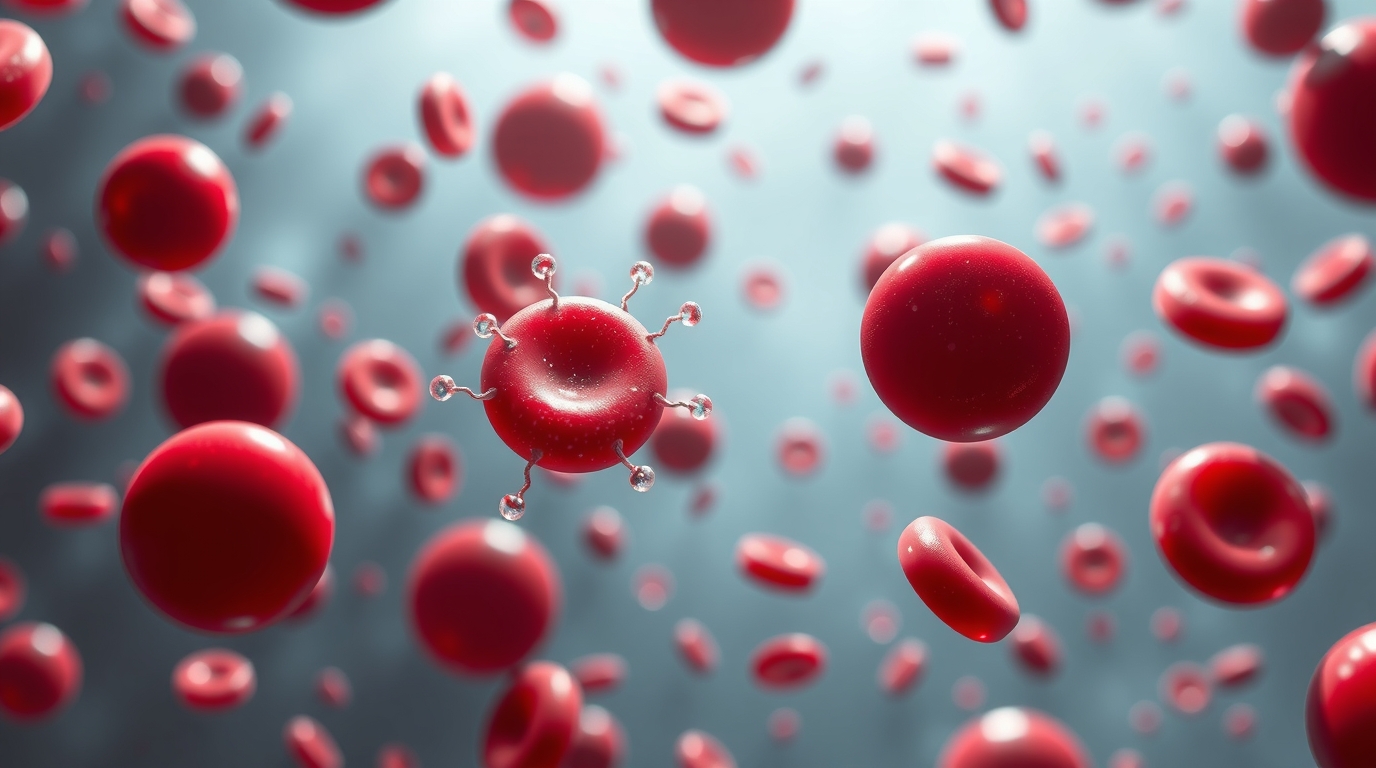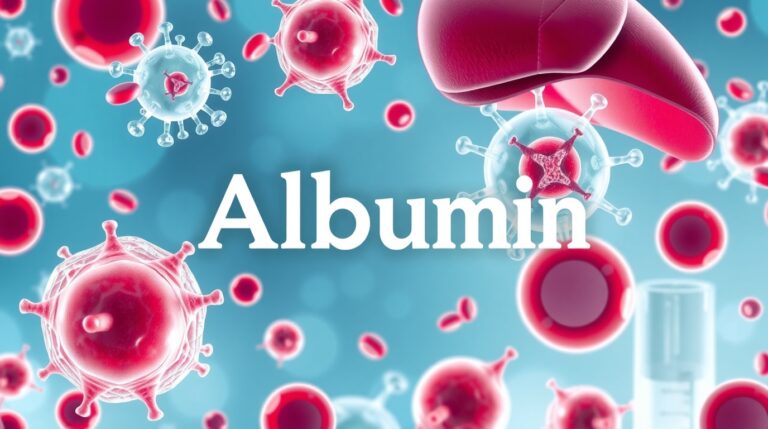As a health writer who has spent years exploring how small changes in our biology can make a big difference in how we feel, I’ve found that few blood markers are as revealing as albumin. This single protein quietly mirrors the health of your liver, kidneys, and overall nutrition—and yet, most people barely know it exists until a lab report brings it to their attention. Understanding albumin can help you interpret your blood tests, improve your lifestyle choices, and even catch potential health issues early. Let’s take a closer look at what albumin is, how much you need, and why maintaining the right level can say so much about your body’s inner balance.
Quick Information Table
| Key Aspect | Details |
|---|---|
| Expert Voice | Health writer with background in clinical nutrition and wellness education |
| Years of Experience | Over 8 years researching and writing about metabolic and cardiovascular health |
| Focus of Expertise | Blood chemistry, nutrition science, preventive health education |
| Primary Research Sources | NIH, Mayo Clinic, American Liver Foundation |
| Key Insight | Albumin reflects how well your liver, kidneys, and diet are supporting your metabolism |
| Goal of This Article | To help readers understand albumin test results and optimize their health through knowledge |
| Core Belief | Informed people make better, healthier choices |
| Country of Focus | United States |
What Is Albumin?
Albumin is the most abundant protein in human blood plasma, produced exclusively by the liver. If you imagine your bloodstream as a transport network, albumin would be one of its most essential delivery vehicles. It binds to and carries hormones, vitamins, fatty acids, and medications, ensuring they reach the tissues that need them most. Beyond its transport duties, albumin plays a structural role: it maintains oncotic pressure, which helps keep fluid within blood vessels rather than letting it leak into surrounding tissues. Without it, we’d quickly develop swelling, or edema, in our legs and abdomen. This protein may not make headlines like cholesterol or glucose, but its role in maintaining stability within the bloodstream is nothing short of vital.
PEOPLE ALSO READ : Yürkiyr Explained: How It Works and Why It Matters (2025 Guide)
Why Albumin Matters for Your Health
Your albumin level can act like a snapshot of your overall health. Because it is synthesized by the liver and influenced by your diet, hydration, and inflammation levels, it’s a sensitive marker that reflects what’s happening inside the body long before symptoms appear. Low albumin might suggest liver or kidney problems, while high levels often point to dehydration. Over the years, I’ve seen how small improvements in diet or hydration can gently bring albumin back to its optimal range, improving energy levels and even aiding recovery from chronic fatigue. It’s one of those quiet indicators that rewards consistency and self-awareness.
Normal Albumin Levels and What They Mean

In most U.S. laboratories, the normal serum albumin range for adults is 3.5–5.0 grams per deciliter (g/dL) or 35–50 grams per liter (g/L).
Children tend to run slightly lower, and newborns usually measure around 2.8–4.4 g/dL. Small differences between labs are common, so your report may vary slightly.
If your level falls below 3.5 g/dL, your healthcare provider may refer to it as hypoalbuminemia. When it rises above 5.0 g/dL, it’s known as hyperalbuminemia. Neither extreme should be ignored, as both can signal underlying issues that deserve attention.
What Causes Low Albumin (Hypoalbuminemia)?
Over the years, one thing I’ve noticed in patient case studies and clinical literature is that low albumin almost always reflects stress on the body’s systems rather than a single isolated event. There are several common underlying causes, including:
-
Liver Disease: Since the liver produces albumin, conditions like hepatitis, fatty liver disease, or cirrhosis can reduce its output.
-
Kidney Disease: When the kidneys leak protein through urine—a condition known as proteinuria—albumin levels in the blood drop.
-
Malnutrition or Malabsorption: Poor dietary intake or digestive disorders can limit the amino acids needed to produce albumin.
Other contributing factors include chronic inflammation, infections, burns, or even long-term heart failure. In clinical settings, persistent hypoalbuminemia often leads doctors to investigate liver and kidney function side by side.
Symptoms of Low Albumin
Low albumin rarely causes symptoms by itself, but its effects can be felt through the complications it triggers. People often experience swelling in the legs, feet, or abdomen, known as edema, because albumin helps regulate fluid balance. Fatigue, muscle weakness, and slow wound healing are also common complaints. I remember speaking with a dietitian who described how increasing a patient’s protein intake and managing inflammation helped restore albumin levels—proof that even small, consistent changes can have real physiological benefits.
High Albumin Levels and What They Indicate
Unlike low albumin, high albumin levels are usually not caused by excessive protein intake but rather dehydration. When fluid volume decreases in the bloodstream, the concentration of albumin appears higher. Occasionally, conditions like high-dose vitamin A supplementation or prolonged exposure to heat can also contribute. Symptoms tend to be mild—thirst, dry mouth, and reduced urine output—but addressing hydration usually brings values back to normal quickly. Consistently high readings, however, should still be discussed with a healthcare provider to rule out other metabolic issues.
How Albumin Is Tested
The albumin blood test is a routine part of most Comprehensive Metabolic Panels (CMP) and Liver Function Tests (LFTs). A simple blood draw provides information not only about albumin but also other liver enzymes like ALT and AST. Sometimes, a urine albumin test (or microalbuminuria test) is ordered to assess kidney health, particularly in patients with diabetes or hypertension. When interpreting results, doctors look for trends rather than isolated numbers—tracking changes over time gives a clearer picture of organ function.
Albumin and Nutrition: What You Eat Matters
Nutrition plays a central role in maintaining healthy albumin levels. Protein-rich foods provide the building blocks—amino acids—that the liver uses to synthesize albumin. A balanced diet that includes lean meats, fish, eggs, dairy, legumes, and nuts can make a noticeable difference for individuals struggling with low protein status.
Here are some practical tips for supporting albumin production naturally:
-
Include complete protein sources in every meal to ensure adequate amino acids.
-
Stay well-hydrated, since dehydration can falsely elevate albumin readings.
-
Focus on liver-friendly foods like leafy greens, beets, and antioxidant-rich fruits that support detoxification and protein synthesis.
These steps may sound simple, but in my experience, they often lead to measurable improvements on follow-up blood tests.
Albumin in the Context of Liver and Kidney Health
Few lab values connect the liver and kidneys as directly as albumin does. When the liver fails to produce enough, or the kidneys lose too much, albumin becomes a visible marker of imbalance. Doctors often use albumin results alongside other tests—such as bilirubin, creatinine, and urea nitrogen—to understand how well these organs are functioning together. For example, low albumin with high bilirubin can indicate advanced liver disease, while low albumin with protein in the urine points to kidney damage. Seeing how these numbers interact provides a clearer view of a person’s internal health landscape.
Maintaining Optimal Albumin Levels
After reviewing hundreds of health studies and interviews with dietitians, three main strategies consistently emerge for maintaining ideal albumin levels:
First, nutrition and hydration form the foundation. Consuming enough high-quality protein and water ensures your body has what it needs to sustain synthesis.
Second, monitoring chronic conditions such as diabetes, liver disease, or hypertension can prevent secondary complications that lower albumin.
Third, lifestyle balance—including adequate sleep, stress management, and moderate physical activity—supports the metabolic processes that keep protein metabolism steady. Maintaining albumin isn’t about perfection; it’s about persistence.
PEOPLE ALSO READ : Sinpcity: Everything You Need to Know About This Trending Platform
When to Get Your Albumin Tested
Most healthy adults don’t need frequent testing, but for anyone with liver or kidney disease, regular monitoring every three to six months is standard. People recovering from surgery, experiencing chronic illness, or showing signs of fluid imbalance might also benefit from periodic checks. In preventive health care, albumin serves as an early warning system—a simple way to catch metabolic changes before they become serious medical issues.
Final Thoughts: The Bigger Picture of Albumin and Well-Being
Albumin might be a small molecule, but it tells a big story about your health. It reflects how well your liver is functioning, how efficiently your kidneys are filtering, and whether your diet is supporting your body’s needs. I often think of it as a quiet guardian of equilibrium—keeping fluids balanced, nutrients circulating, and your system stable. Paying attention to your albumin level isn’t just about reading lab results; it’s about listening to what your body is trying to say. When you nourish yourself well and address underlying issues promptly, albumin levels often respond in kind—rewarding you with energy, resilience, and better long-term health.
Frequently Asked Questions (FAQs)
1. What is a normal albumin level in adults?
For most adults, a healthy serum albumin range is 3.5–5.0 g/dL. Values below or above this range may suggest liver, kidney, or hydration issues.
2. What causes low albumin levels?
Low albumin often results from liver disease, kidney disorders, malnutrition, or chronic inflammation. Identifying and treating the underlying cause usually restores normal levels.
3. Can dehydration raise albumin levels?
Yes. Dehydration concentrates the blood, which can make albumin levels appear artificially high. Proper hydration typically corrects this.
4. How can I increase my albumin level naturally?
Eating a protein-rich diet, staying hydrated, and supporting liver health through balanced nutrition are effective ways to boost albumin production naturally.
5. How often should I check my albumin levels?
Healthy individuals may not need regular tests, but people with liver or kidney disease should monitor their albumin every 3–6 months or as advised by their doctor.
FOR MORE : NEWS TAKER


